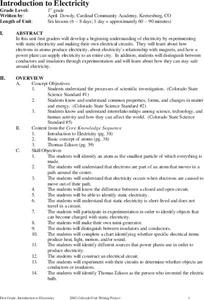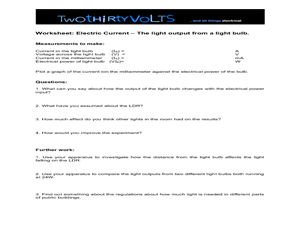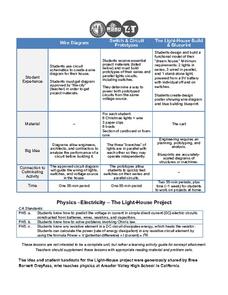Curated OER
Bipolar Junction Transistor Theory
In this electrical learning exercise, students draw a schematic design and build a bipolar transistor to grasp the understanding of bipolar junction transistor theory before answering a series of 28 open-ended questions. Students...
Curated OER
Electricity
Students explore electricity. After watching a PowerPoint presentation, students discuss the composition of electricity and how it is made. They participate in discovery activities by rotation through four activity stations set up on the...
Curated OER
IGFET amplifiers
In this electronics learning exercise, students draw a schematic design and build a circuit board to grasp the understanding of IGFET amplifiers before answering a series of 2 open-ended questions with schematics. This learning exercise...
Institute of Electrical and Electronics Engineers
Series and Parallel Circuits
Young scholars demonstrate simple circuits and find the differences between parallel and serial circuits. In this electronic lesson plan students work in teams to test different designs using a low voltage light bulb.
Curated OER
Changing Circuits
Students study how bulbs work by studying a series circuit and its components. In this electricity study lesson, students complete a SmartBoard online activity to study a bulb light in an electrical circuit. Students discuss what would...
Curated OER
Electricity
Students experiment with a series of circuits. In this chemistry lesson, students discuss voltage, resistance and current as they flow through an electrical circuit. They work in pairs to solve the questions.
Curated OER
Introduction to Electricity
Students experiment with static electricity and make their own electrical circuits. Students experiment with their circuits to explore conductors and insulators. Students identify Thomas Edison as the person who invented the electric bulb.
Curated OER
Electricity
Students examine basic electrical components. They build a simple electrical circuit which rings a buzzer. They experiment with conducting and nonconducting materials.
Teach Engineering
Can You Resist This?
Some things are hard to resist. Small collaborative groups build circuits and calculate the voltage using Ohm's Law. Budding engineers explore the connection between the voltage across different resistors and linear...
Curated OER
Series or Parallel?
Emerging electricians extend mental models of light bulbs and resistors in series and or in parallel circuits to include the connection of photovoltaic cells in arrays. They investigate open circuits, using a DC voltmeter, a light...
IOP Institute of Physics
Physics in Concert
What do physicists and musicians have in common? A lot more than you might think. After first viewing a slide show presentation and completing a series of skills practice worksheets on the physics of light, sound, and...
Purdue University
Light – Just Right!
What does it mean to be resistant to electricity? Scholars answer the question in a six-part STEM instructional activity on electricity. They begin by assessing the conductivity of several different materials and progress to designing...
Utah Education Network (UEN)
Utah Open Textbook: 5th Grade Science
How do Earth's changes affect humans? Pupils learn about physical and chemical changes on Earth and how they lead to erosion, earthquakes, and volcanoes. Using the text, they also explore the concepts of electricity and magnetism by...
Curated OER
Electric Current: The Light Output from a Light Bulb
Students investigate the energy used by a light bulb. In this electrical energy lesson plan, students conduct an investigation to explain the relationship between the output of light and the electrical power used by a light bulb.
Curated OER
Electricity and Energy
Learners demonstrate that electricity can flow in a circuit. They demonstrate safe practices during lab investigations.
Curated OER
Resistance In Series And Parallel Circuits
Students investigate electric circuits. For this electricity lesson, students observe illumination in a series and parallel circuits. They predict and calculate the resistance in each type of circuit using a voltmeter.
Physics Classroom
Ohm's Law: Voltage-Current-Resistance Relationship
Join the resistance—Ohm! Scholars apply Ohm's Law to problems of increasing difficulty as part of a series on electric circuits. The lesson begins with simply doubling and tripling voltage or resistance. It ends with having pupils solve...
Carnegie Mellon University
Battery Workshop
Introduce your class to the workings and parts of a battery-operated circuit. Pairs of pupils use lemons to make batteries and measure voltage and current with a multimeter. An accompanying worksheet is used for recording values and...
eGFI
Design a Thermostat
Using a thermostat is an eco-friendly way to control indoor climate. Young engineers practice building electric circuits by designing and constructing a thermostat. Plenty of background information, a vocabulary list, links to the...
Curated OER
Electrical Generators
Learners study what an electric generator does and its history. For this energy lesson students complete several experiments including building their own electric generator.
Curated OER
Many Paths
Students explore the composition and practical application of parallel circuitry, compared to series circuitry. They design and build parallel circuits and investigate their characteristics, and apply Ohm's law. They recognize that...
Curated OER
Get Charged!
Learners explore the concept of electricity in this activity based unit. In this physical science lesson, students focus on electricity and electrical engineering. The teaching unit includes 5 activities to develop learners...
Trash For Teaching
The Light-House Project
Groups work together to design a lighthouse, from designing and drawing the wiring diagram, to creating prototypes of the switch and circuit, to envisioning and building a scale model along with a blueprint. By including different...
Teach Engineering
Building a Piezoelectric Generator
In pairs, learners build a piezoelectric generator from readily available electric components in the second and final installment of the two-part series. Tapping the piezoelectric element produces enough electricity to light an LED....























